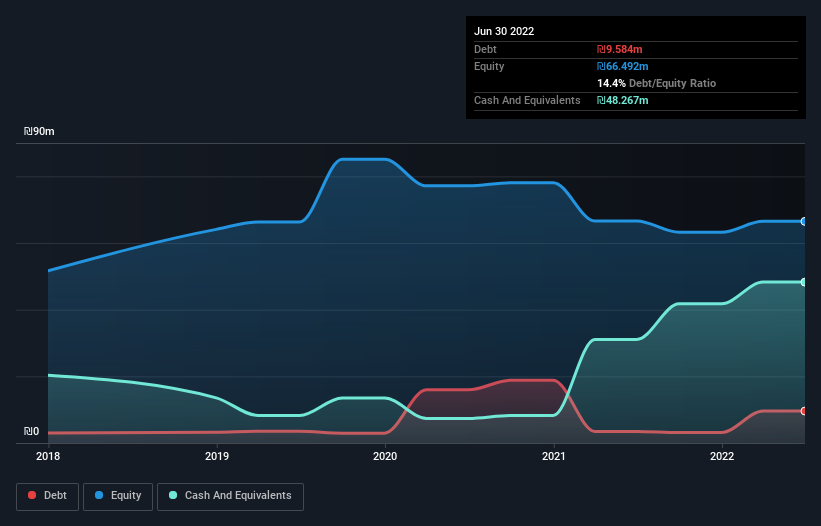
The external fund manager backed by Berkshire Hathaway's Charlie Munger, Li Lu, makes no bones about it when he says 'The biggest investment risk is not the volatility of prices, but whether you will suffer a permanent loss of capital.' So it might be obvious that you need to consider debt, when you think about how risky any given stock is, because too much debt can sink a company. As with many other companies Decama Capital Ltd (TLV:DCMA) makes use of debt. But should shareholders be worried about its use of debt?
Why Does Debt Bring Risk?
Generally speaking, debt only becomes a real problem when a company can't easily pay it off, either by raising capital or with its own cash flow. Ultimately, if the company can't fulfill its legal obligations to repay debt, shareholders could walk away with nothing. However, a more usual (but still expensive) situation is where a company must dilute shareholders at a cheap share price simply to get debt under control. Of course, debt can be an important tool in businesses, particularly capital heavy businesses. When we think about a company's use of debt, we first look at cash and debt together.
View our latest analysis for Decama Capital
What Is Decama Capital's Net Debt?
As you can see below, at the end of June 2022, Decama Capital had ₪9.58m of debt, up from ₪3.48m a year ago. Click the image for more detail. However, its balance sheet shows it holds ₪48.3m in cash, so it actually has ₪38.7m net cash.

How Healthy Is Decama Capital's Balance Sheet?
The latest balance sheet data shows that Decama Capital had liabilities of ₪24.1m due within a year, and liabilities of ₪711.0k falling due after that. Offsetting this, it had ₪48.3m in cash and ₪2.88m in receivables that were due within 12 months. So it can boast ₪26.3m more liquid assets than total liabilities.
This luscious liquidity implies that Decama Capital's balance sheet is sturdy like a giant sequoia tree. Having regard to this fact, we think its balance sheet is as strong as an ox. Succinctly put, Decama Capital boasts net cash, so it's fair to say it does not have a heavy debt load! There's no doubt that we learn most about debt from the balance sheet. But you can't view debt in total isolation; since Decama Capital will need earnings to service that debt. So if you're keen to discover more about its earnings, it might be worth checking out this graph of its long term earnings trend.
In the last year Decama Capital had a loss before interest and tax, and actually shrunk its revenue by 43%, to ₪4.8m. To be frank that doesn't bode well.
So How Risky Is Decama Capital?
Statistically speaking companies that lose money are riskier than those that make money. And the fact is that over the last twelve months Decama Capital lost money at the earnings before interest and tax (EBIT) line. And over the same period it saw negative free cash outflow of ₪6.2m and booked a ₪640k accounting loss. With only ₪38.7m on the balance sheet, it would appear that its going to need to raise capital again soon. Overall, its balance sheet doesn't seem overly risky, at the moment, but we're always cautious until we see the positive free cash flow. When analysing debt levels, the balance sheet is the obvious place to start. But ultimately, every company can contain risks that exist outside of the balance sheet. We've identified 4 warning signs with Decama Capital (at least 2 which make us uncomfortable) , and understanding them should be part of your investment process.
Of course, if you're the type of investor who prefers buying stocks without the burden of debt, then don't hesitate to discover our exclusive list of net cash growth stocks, today.
New: Manage All Your Stock Portfolios in One Place
We've created the ultimate portfolio companion for stock investors, and it's free.
• Connect an unlimited number of Portfolios and see your total in one currency
• Be alerted to new Warning Signs or Risks via email or mobile
• Track the Fair Value of your stocks
Have feedback on this article? Concerned about the content? Get in touch with us directly. Alternatively, email editorial-team (at) simplywallst.com.
This article by Simply Wall St is general in nature. We provide commentary based on historical data and analyst forecasts only using an unbiased methodology and our articles are not intended to be financial advice. It does not constitute a recommendation to buy or sell any stock, and does not take account of your objectives, or your financial situation. We aim to bring you long-term focused analysis driven by fundamental data. Note that our analysis may not factor in the latest price-sensitive company announcements or qualitative material. Simply Wall St has no position in any stocks mentioned.
About TASE:DCMA
Decama Capital
Decama Capital Ltd, an investment company, operates in the real estate business in Israel and internationally.
Flawless balance sheet with weak fundamentals.


